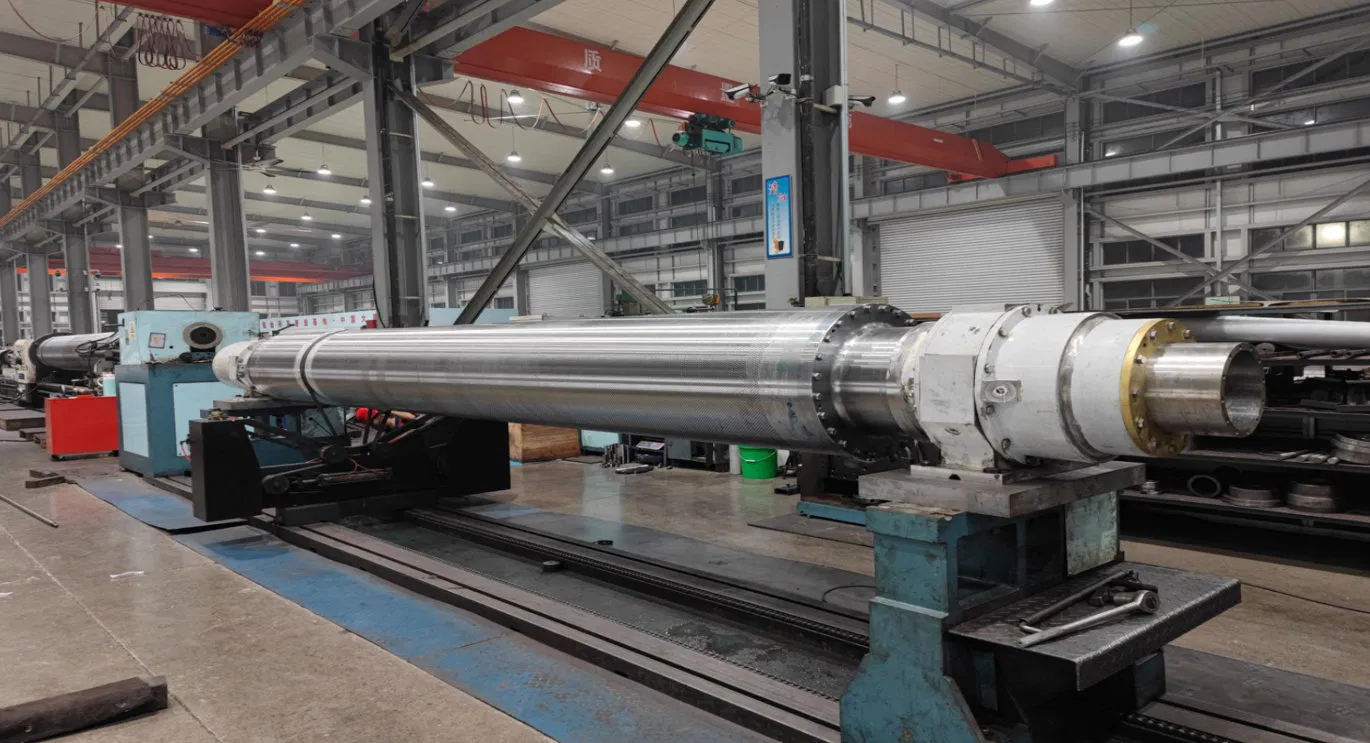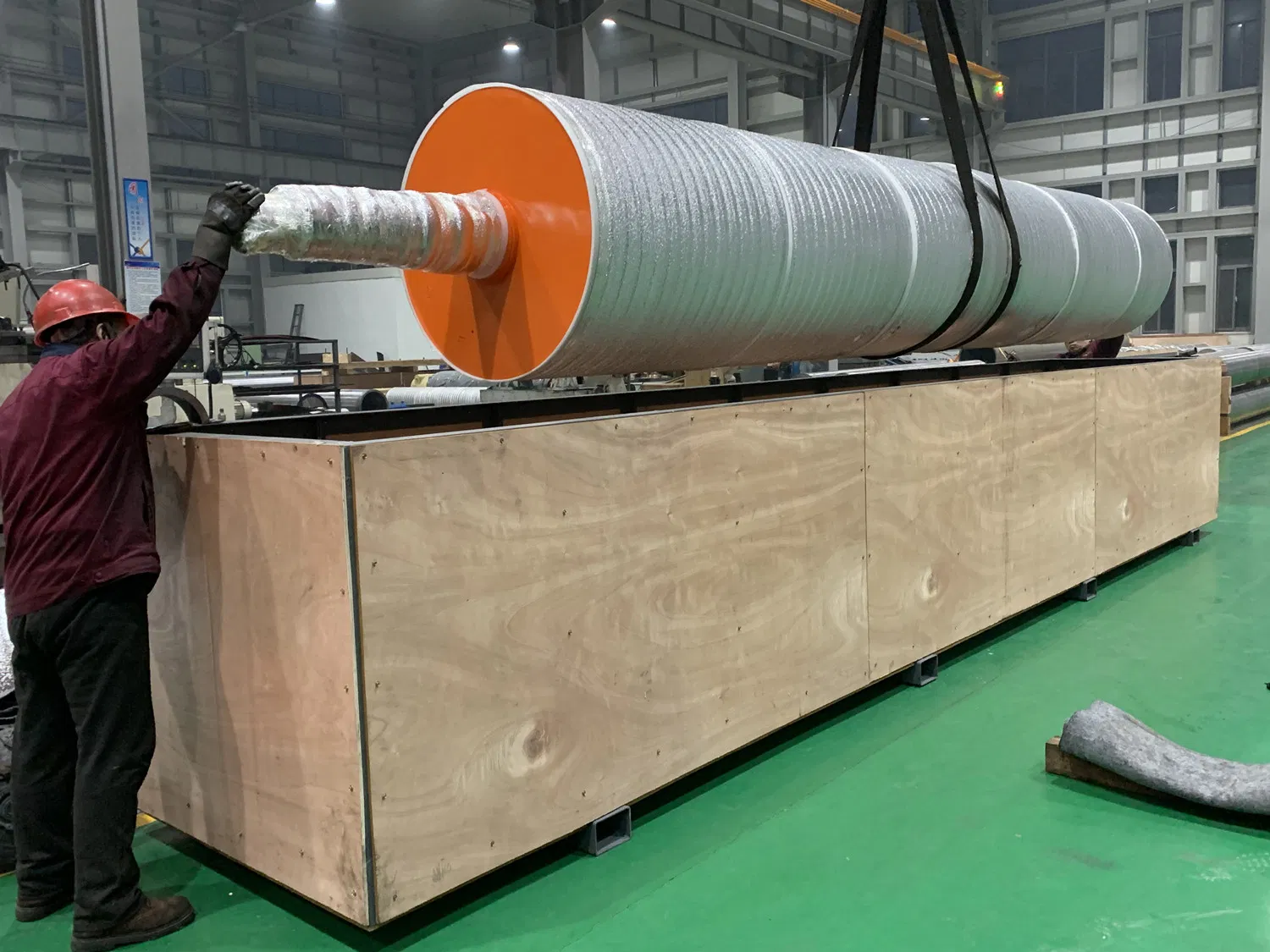In the demanding world of pulp and paper production, every component plays a pivotal role in determining efficiency, product quality, and ultimately, your mill's profitability. Among these, paper machine rolls stand out as truly critical. They are, quite frankly, the unsung heroes, directly impacting everything from sheet formation and dewatering to drying and finishing. Generic, off-the-shelf rolls might seem like a straightforward solution, but in my experience, they often fall short of delivering optimal performance for the unique demands of individual mills. This is where the power of custom engineering truly shines.
Have you ever wondered what separates a good paper machine from a truly exceptional one? Often, it boils down to the precision and customization of its core components. We're not just talking about fitting a roll; we're talking about a roll that's been meticulously designed and manufactured to integrate seamlessly with your specific machine, your paper grades, and your operational environment. This article will delve deep into why investing in custom paper machine rolls is not just an expense, but a strategic move that promises significant returns. We’ll explore the engineering marvel behind these rolls, guide you through the process of obtaining a tailored quote, and most importantly, show you how to conduct a robust ROI analysis that proves their value.
The Unsung Heroes of Papermaking: Why Rolls Matter More Than You Think
Think about the journey of pulp from slurry to finished paper. It’s a complex dance of water removal, pressing, drying, and calendering, all orchestrated by a series of precisely calibrated rolls. Each roll, whether it's a forming roll, press roll, dryer roll, or calender roll, has a distinct function, and its performance directly influences the end product. A slight deviation in surface finish, an imbalance, or an inappropriate material can lead to a cascade of problems: uneven moisture profiles, sheet breaks, quality defects, increased energy consumption, and ultimately, costly downtime.
To be honest, many mills operate with rolls that are "good enough," but "good enough" rarely translates to "optimal." The cumulative effect of minor inefficiencies across dozens of rolls can significantly erode profit margins over time. For instance, a press roll with suboptimal dewatering capabilities will force your dryer section to work harder, consuming more energy and potentially slowing down your machine speed. Similarly, a calender roll that doesn't provide the perfect nip can compromise the desired smoothness and thickness of your paper, leading to rejected product.
This is precisely why the concept of "Precision Engineered for Your Mill: Get a Custom Paper Machine Roll Quote & ROI Analysis Today" is gaining traction. It’s about moving beyond the standard and embracing solutions that are purpose-built for your operational realities. When rolls are designed with your specific machine's vibration characteristics, temperature profiles, and even the unique fiber composition of your pulp in mind, the gains in efficiency and quality can be remarkable. It’s a shift from a reactive maintenance approach to a proactive optimization strategy, ensuring every rotation contributes maximally to your production goals.
Beyond Off-the-Shelf: The Power of Precision Engineering for Your Mill
What does "precision engineered" truly mean in the context of paper machine rolls? It’s far more than just manufacturing a roll to a specified dimension. It encompasses a holistic approach that considers every aspect of the roll's interaction with your machine and the paper web. This involves advanced material science, sophisticated surface treatments, and dynamic balancing techniques that ensure flawless operation at high speeds.
Tailoring Technology: Materials and Coatings
The material selection for a paper machine roll is paramount. It needs to withstand immense pressure, high temperatures, corrosive chemicals, and abrasive wear. Generic rolls often use standard alloys, but a precision-engineered roll might incorporate specialized steels, composite materials, or advanced ceramic coatings. For example, a press roll might benefit from a rubber cover formulated to optimize dewatering and reduce energy consumption, while a calender roll might require a hard chrome or tungsten carbide coating for superior wear resistance and surface finish. Many experts agree that the right coating can extend roll life by years and significantly improve paper quality.
Interestingly enough, the choice of material and coating isn't just about durability; it's also about performance. A custom-designed roll can be engineered to have specific thermal properties, ensuring consistent temperature distribution across the roll face, which is crucial for uniform drying and calendering. Similarly, surface finishes can be tailored to optimize friction, release properties, and even water removal efficiency, directly impacting machine speed and paper quality.
The Art of Balance: Vibration and Performance
At thousands of revolutions per minute, even a minuscule imbalance in a paper machine roll can translate into significant vibrations. These vibrations not only cause wear and tear on bearings and other machine components but also lead to sheet breaks, uneven paper profiles, and reduced machine speeds. Precision engineering involves rigorous dynamic balancing, often exceeding industry standards, to ensure the roll runs smoothly and stably under operational conditions. This meticulous attention to balance minimizes destructive vibrations, prolongs the life of your equipment, and contributes directly to optimizing paper mill efficiency with custom rolls.

Frankly speaking, the initial investment in a custom-engineered roll might be higher than an off-the-shelf alternative. However, the long-term benefits in terms of reduced maintenance, increased uptime, improved product quality, and enhanced energy efficiency quickly justify this investment. It's about understanding that a roll isn't just a spinning cylinder; it's a highly sophisticated component that can either be a bottleneck or a catalyst for your mill's success.
Demystifying the Process: Getting a Custom Paper Machine Roll Quote
So, you're convinced that custom rolls are the way to go. What's the next step? Getting a custom paper machine roll quote is a collaborative process that begins with a detailed understanding of your specific needs and challenges. It’s not about picking an item from a catalog; it’s about co-creating a solution.
The first step typically involves a comprehensive consultation. Be prepared to share detailed information about your existing machine, including its make, model, age, and current operational parameters. This includes machine speed, paper grades produced, current roll dimensions, bearing types, and any existing performance issues you're experiencing (e.g., frequent sheet breaks, uneven moisture, excessive vibration, short roll life). The more information you provide, the more accurately the manufacturer can engineer a solution tailored to your mill.
I've found that the best manufacturers will send engineers to your site for an assessment. This on-site visit allows them to truly understand your operating environment, observe your machine in action, and identify unique challenges that might not be apparent from blueprints alone. They might use specialized diagnostic tools to measure vibration, temperature, or even conduct a thorough inspection of your existing rolls and related components. This specialized paper roll manufacturing for pulp and paper industry requires a deep understanding of your operations.
Following the assessment, the engineering team will develop a detailed proposal. This will include recommendations for materials, coatings, design modifications, and manufacturing processes. The quote will break down the costs associated with design, material acquisition, manufacturing, testing, and delivery. It's worth noting that a good quote will also include an estimated timeline for production and delivery, allowing you to plan your maintenance schedules accordingly. Don't hesitate to ask questions during this phase; clarity on every aspect of the proposal is key to a successful partnership.
The Bottom Line: Unpacking the ROI Analysis of Custom Rolls
This is where the rubber meets the road. While the initial cost of a custom-engineered roll might be higher, the return on investment (ROI) can be substantial and multifaceted. A thorough ROI analysis goes beyond the purchase price and considers the long-term operational savings and performance improvements. It's about understanding the true cost-benefit analysis for paper machine roll upgrades.
Quantifying the Gains: Metrics That Matter
When conducting an ROI analysis, consider the following key areas where custom rolls deliver value:
- Reduced Downtime: Custom rolls, built for durability and precision, are less prone to premature wear, failures, and the need for frequent maintenance. Less downtime means more production hours. Quantify this by estimating avoided lost production revenue.
- Improved Paper Quality: Consistent roll performance leads to more uniform paper properties – better moisture profiles, smoother surfaces, and consistent caliper. This reduces waste, minimizes customer complaints, and can even command higher prices for your product. Calculate the value of reduced rejects and improved marketability.
- Increased Machine Speed: Optimized dewatering, reduced vibrations, and superior web handling allow your machine to run at higher speeds without compromising quality or increasing sheet breaks. Even a small percentage increase in speed can translate to significant additional tonnage produced annually.
- Lower Energy Consumption: Efficient dewatering (especially in press sections) directly reduces the energy load on your dryer section. Better-balanced rolls also reduce energy consumed by motors due to less vibration and friction. Calculate the energy savings in kWh and convert to monetary value.
- Extended Roll Life: Precision engineering and superior materials mean custom rolls last longer, reducing the frequency of replacement and associated costs (purchase, shipping, installation).
- Reduced Maintenance Costs: Fewer breakdowns, less frequent grinding, and longer intervals between major overhauls contribute to lower labor and material costs for maintenance.

Case Studies (Hypothetical): Realizing Returns
Let's consider a hypothetical scenario: A mill producing 500 tons/day of linerboard experiences frequent sheet breaks in its press section, leading to 2 hours of downtime per week. By investing in a custom-engineered press roll, they reduce sheet breaks by 50%, cutting downtime by an hour per week. At an average revenue of $500/ton, and 500 tons/day production, that's an extra $250/ton * 500 tons = $125,000 per hour of production. Saving one hour per week translates to $125,000 * 52 weeks = $6,500,000 in avoided lost revenue annually. This substantial figure quickly overshadows the initial investment in the custom roll.
Another example: A mill finds that its dryer section is consuming excessive energy due to inefficient dewatering upstream. A detailed cost-benefit analysis for paper machine roll upgrades, specifically focusing on a custom-designed suction roll, reveals that the improved dewatering reduces steam consumption by 10%. If their annual steam cost for drying is $1,000,000, that's a $100,000 annual saving directly attributable to the new roll. These tangible benefits underscore why "Precision Engineered for Your Mill: Get a Custom Paper Machine Roll Quote & ROI Analysis Today" is a call to action for operational excellence.
A Partnership for Progress: Beyond the Initial Investment
The relationship with a custom paper machine roll manufacturer shouldn't end with the delivery of your new roll. True value comes from a long-term partnership that ensures ongoing support, maintenance, and future optimization. A reputable manufacturer will offer comprehensive after-sales services, including routine inspections, maintenance recommendations, and reconditioning services to extend the life of your custom rolls even further.
In my experience, the best partnerships involve continuous collaboration. As your mill evolves, perhaps with new paper grades, increased machine speeds, or changes in raw materials, your roll supplier should be a resource for adapting your existing rolls or designing new ones to meet these emerging needs. This proactive approach to maintenance and upgrades ensures that your paper machine remains at the forefront of efficiency and productivity, consistently delivering optimal paper mill efficiency with custom rolls.
Frankly speaking, investing in custom paper machine rolls is investing in the future resilience and competitiveness of your mill. It's about moving beyond generic solutions and embracing the tailored precision that can unlock significant operational and financial advantages.
Your Mill's Future: Act Today for Unrivaled Performance
The pulp and paper industry is constantly evolving, with increasing pressures on efficiency, sustainability, and product quality. In this environment, relying on outdated or generic equipment is no longer a viable strategy for sustained success. The path to achieving peak performance, reducing operational costs, and enhancing your competitive edge lies in embracing solutions that are truly optimized for your unique mill.
By choosing rolls that are Precision Engineered for Your Mill: Get a Custom Paper Machine Roll Quote & ROI Analysis Today, you’re not just buying a component; you're investing in a strategic asset that will drive profitability and ensure consistent, high-quality output for years to come. Don't let inefficiencies erode your margins. Take the proactive step to understand the profound impact custom-engineered rolls can have on your bottom line.
The time to act is now. Unlock the full potential of your paper machine and secure a future of unparalleled performance.
For more detailed information, please visit our official website:Custom paper machine rolls
About the author: Dr. Alistair Finch is a veteran mechanical engineer with over 25 years of experience specializing in industrial machinery optimization for the pulp and paper sector. His expertise lies in precision component design, material science, and advanced ROI modeling for large-scale manufacturing processes. Alistair is passionate about helping mills achieve peak operational efficiency and sustainable growth through innovative engineering solutions.


